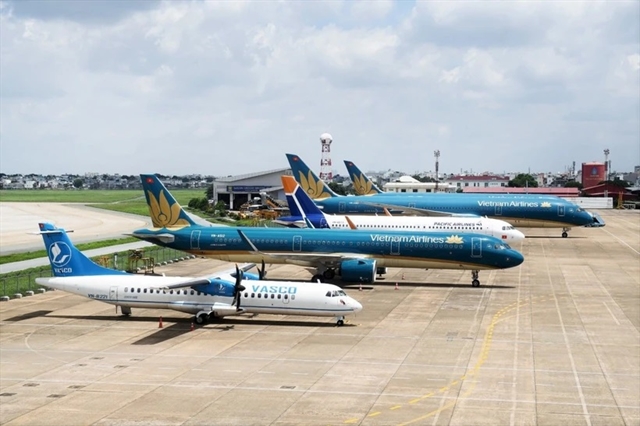Aviation authority urges airlines to boost capacity amid aircraft shortages
Society – Economy - Ngày đăng : 16:54, 01/07/2024
 |
| Vietnam Airlines' fleet at the airport. — Photo vietnamplus.vn |
HÀ NỘI — The Civil Aviation Authority of Vietnam (CAAV) has issued an urgent directive to domestic airlines to promptly address the ongoing aircraft shortage and implement flexible pricing strategies.
The directive comes in response to the global recall of Pratt & Whitney (PW) engines affecting Airbus A320 and A321 NEO aircraft, which has resulted in the grounding of a significant number aircraft operated by Vietnamese airlines.
Lê Hồng Hà, Director-General of the national flag carrier Vietnam Airlines (VNA), said VNA had grounded 11 aircraft due to the recall and expects to ground another six by the end of this year.
The lengthy repair and maintenance process, taking between 250 to 300 days, means VNA's aircraft shortage is projected to persist throughout 2024 and gradually ease by mid-2025.
To mitigate the impact of the shortage, CAAV has instructed the airlines to seek and secure replacement aircraft from leasing partners worldwide to fill the void left by grounded aircraft.
They are also urged to prioritise increasing capacity on air routes with high tourism demand, especially those serving Cần Thơ International Airport.
Regarding airfares, CAAV has requested the airlines to ensure transparency in pricing by clearly displaying all components of ticket prices to avoid misleading.
They are also requested to implement flexible pricing structures that cater to the diverse needs of passengers and market conditions and strengthen monitoring and supervision of electronic ticketing systems and agent-based sales channels to prevent violations of pricing regulations.
Before the directive, CAAV conducted inspections to assess the pricing practices of four airlines and six travel agencies. The inspections revealed that all the entities adhered to the pricing framework established by the Ministry of Transport.
The PW engine recall has affected over 1,500 A320 and A321 NEO aircraft globally, with approximately 340 (nearly 30 per cent) requiring grounding. — VNS
